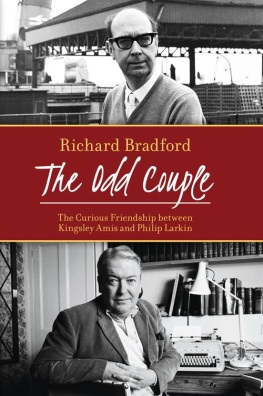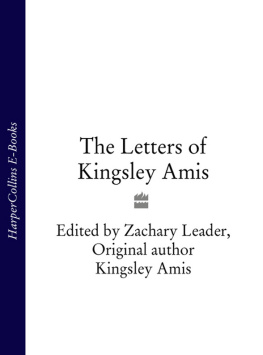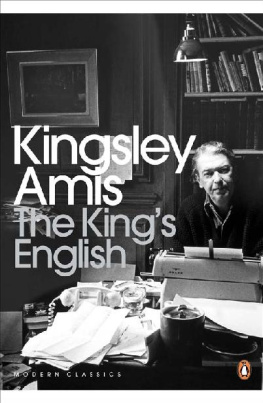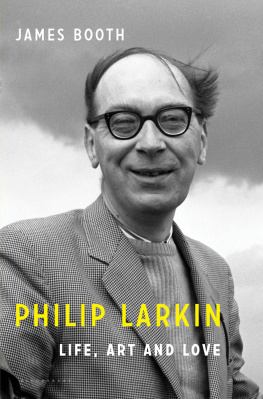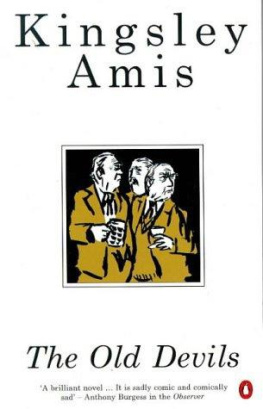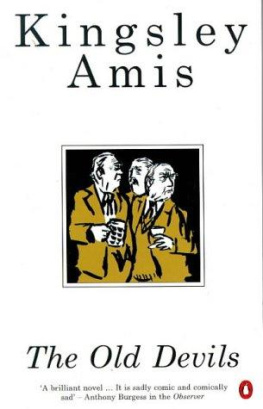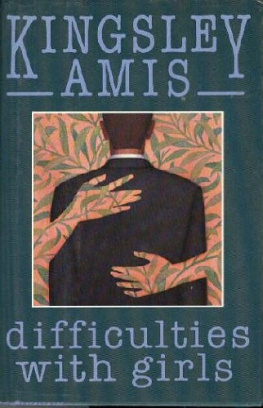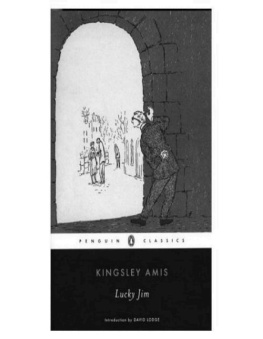Richard Bradford - The Odd Couple: The Curious Friendship Between Kingsley Amis and Philip Larkin
Here you can read online Richard Bradford - The Odd Couple: The Curious Friendship Between Kingsley Amis and Philip Larkin full text of the book (entire story) in english for free. Download pdf and epub, get meaning, cover and reviews about this ebook. year: 2012, publisher: The Robson Press, genre: Detective and thriller. Description of the work, (preface) as well as reviews are available. Best literature library LitArk.com created for fans of good reading and offers a wide selection of genres:
Romance novel
Science fiction
Adventure
Detective
Science
History
Home and family
Prose
Art
Politics
Computer
Non-fiction
Religion
Business
Children
Humor
Choose a favorite category and find really read worthwhile books. Enjoy immersion in the world of imagination, feel the emotions of the characters or learn something new for yourself, make an fascinating discovery.
- Book:The Odd Couple: The Curious Friendship Between Kingsley Amis and Philip Larkin
- Author:
- Publisher:The Robson Press
- Genre:
- Year:2012
- Rating:4 / 5
- Favourites:Add to favourites
- Your mark:
- 80
- 1
- 2
- 3
- 4
- 5
The Odd Couple: The Curious Friendship Between Kingsley Amis and Philip Larkin: summary, description and annotation
We offer to read an annotation, description, summary or preface (depends on what the author of the book "The Odd Couple: The Curious Friendship Between Kingsley Amis and Philip Larkin" wrote himself). If you haven't found the necessary information about the book — write in the comments, we will try to find it.
Richard Bradford: author's other books
Who wrote The Odd Couple: The Curious Friendship Between Kingsley Amis and Philip Larkin? Find out the surname, the name of the author of the book and a list of all author's works by series.
The Odd Couple: The Curious Friendship Between Kingsley Amis and Philip Larkin — read online for free the complete book (whole text) full work
Below is the text of the book, divided by pages. System saving the place of the last page read, allows you to conveniently read the book "The Odd Couple: The Curious Friendship Between Kingsley Amis and Philip Larkin" online for free, without having to search again every time where you left off. Put a bookmark, and you can go to the page where you finished reading at any time.
Font size:
Interval:
Bookmark:
For Amy
And for Helen and Gerard Burns
D uring a thirty-year period between the mid-1950s and the 1980s, Kingsley Amis and Philip Larkin produced, respectively, the finest fiction and poetry of the era.
In Stanley and the Women Amis contemplates the enclosed, impenetrable condition of insanity as the worst form of human misery, and through Nash, the common-sense psychoanalyst, he allows us a glimpse into his own most essential literary, and, I suppose philosophical, precept: The rewards for being sane may not be very many but knowing whats funny is one of them. And thats an end of the matter (Kingsley Amis, Stanley and the Women, p. 183).
Amis is too often second-graded as a novelist because he knew what was funny. The only comic mode now granted respect by the literati is the kind of surreal speculation on the absurdities of the intellect that finds its way into the work of Joyce, Beckett, Pinter and their successors. It is acceptable because it detaches comedy from anything remotely realistic and because it has more to do with smug elitism than laughter. In Amiss novels we are continuously aware of a presence that hovers behind and around the narrator, always ready to pounce and never willing to allow a piece of dialogue or solemn proclamation of intent to get past without first puncturing whatever pretentions to absolute validity it might carry with it. His work restores to English a brand of comedy lost since the eighteenth century. It is certainly difficult to find a set of beliefs or a code of existence in Amiss work that is actively promoted rather than systematically demolished, but the same could be said of the writings of Jonathan Swift. Amis does not write parables, or submit disguised solutions to personal, intellectual or political problems. Instead, he allows his characters and his own powerfully intolerant intellect to roam through a finely crafted version of the world we know. His work is serious because it is funny.
This same tendency to perceive most human beings as by degrees preposterous and infuriating is what cemented the friendship between Amis and Philip Larkin within weeks of their first encounter in Oxford. For Larkin, however, humour was the flip side of a mordant, depressive state of mind. He began as an able practitioner of fiction but the very nature of the genre, involving as it does an obligation to transplant vast tracts of experience into narrative, was at variance with his temperament. For him, life in general was tiresome enough, and having to endure it yet again in lengthy passages of prose was more than he could stand. Instead, he found in verse a means of shifting between private and public registers without spending too much time with either. His stepping stones were the minutiae of ordinary existence. In Vers de Socit, for example, he has been asked round to dinner by a distinguished university colleague, and he alters the wording of the letter in accordance with his feelings about the prospect.
My wife and I have asked a crowd of craps
To come and waste their time and ours: perhaps
Youd care to join us? In a pigs arse, friend.
Thereafter, the poem becomes the occasion for reflections on how such gatherings prompt him to perceive life as largely a catalogue of equally pointless routines, variously customised to reinforce the assumption that something might matter. As an exercise in depressive loneliness, verging upon nihilism, it matches anything by Kafka. The state of mind rehearsed by the words is unenviable but we are not asked to share it; far more powerful is our feeling of admiration for a work of art. In his verse, Larkin appears to relish the tedious, the ordinary, often the distasteful. What makes his work superior to that of his contemporaries is his ability to graft such material on to poems of seemingly incongruous elegance. For this reason he is loathed. Academics hate him because he is not self-indulgent. He makes his language work for him and the reader, not for them: Theres not much to say about my work. When youve read a poem, thats it, its all quite clear what it means (Philip Larkin, Required Writing: Miscellaneous Pieces, 195582, pp. 534). Academics and other members of the literary establishment dislike writing that is self-evidently beautiful but which does not, like modernism, demand their services as explicators.
Here too, Larkin and Amis have much in common. Both undermine the longstanding injunction of the literary and university hierarchy that, without innovation, writing is intellectually hidebound, indebted to nothing but the past. Each of them disproves this formula by demonstrating that formal conservatism can coexist with urgent questionings of the way we think and live. Moreover, they show that the successful command of traditional techniques requires far more skill and intellectual investment than the tired and predictable practices of experiment.
In the latter half of the twentieth century they were the torchbearers for writing that tested the intellect and sensibility of its readers without resorting to the self-obsessed preoccupations of modernism. The fact that they also maintained an intimate, often difficult, friendship for nearly forty-five years involves another insight into their effect upon literary history. What if hypotheses are generally the hobbyhorses of historians but it is fascinating to wonder about what would have happened if Larkin had not met Amis in the Front Quad of St Johns, Oxford, that day in May 1941, if their encounters during the subsequent year had been merely brief and cursory until Amis departed for military service. They would certainly have become writers but their work would have been very different from what they have bequeathed us. Their continued relationship energised, sometimes even shaped, much of their finest writing. Lucky Jim, the novel that launched Amiss career, could not have been written without Larkin. It was not simply a matter of him offering advice and encouragement to his friend. Their exchanges had by the early 1950s become a site for exclusive disclosures, observations, confessions; the sort of things routinely thought to lie too deep for discussion or exchange. This was the impetus for Amiss debut novel, and indeed their ongoing friendship was the foundation for much of Amiss work of the 1950s. Larkin came to life as a poet with The Less Deceived and The Whitsun Weddings, and Amiss influence was significant for both collections. But while Amis exploited their intimacy for his writing, Larkins mature poetry was largely a reaction against it. In 1961 Larkin felt so drained, even humiliated, by his connection with Amis that he ceased communications with him. Within a decade, amicable relations had been restored. It was not simply that Larkin now felt sufficiently secure with his own literary achievements to allow Amis back. He knew he was an exceptional poet but he knew also that even if he continued to keep Amis at arms length his presence would, until death, be an unrelenting feature of his existence, and would by implication continue to cast a shadow across him as a poet. So with commendable , if wary, resignation, he resumed their friendship.
Aside from its effect on their work, their relationship demonstrates how easy it is to mistake intimacy for exploitation and misapprehension. It would not be inaccurate to state that they knew each other better than anyone else knew either of them, yet quite often it seemed that Amiss perception of Larkin was a convenient simplification of who he really was. Sometimes the latter felt that he had become like a character in one of Amiss novels: authentically engaging and querulous but nonetheless someone elses creation. Conversely, Larkin frequently detected idiosyncracies and preoccupations in Amis to which his friend had blinded himself.
Font size:
Interval:
Bookmark:
Similar books «The Odd Couple: The Curious Friendship Between Kingsley Amis and Philip Larkin»
Look at similar books to The Odd Couple: The Curious Friendship Between Kingsley Amis and Philip Larkin. We have selected literature similar in name and meaning in the hope of providing readers with more options to find new, interesting, not yet read works.
Discussion, reviews of the book The Odd Couple: The Curious Friendship Between Kingsley Amis and Philip Larkin and just readers' own opinions. Leave your comments, write what you think about the work, its meaning or the main characters. Specify what exactly you liked and what you didn't like, and why you think so.

